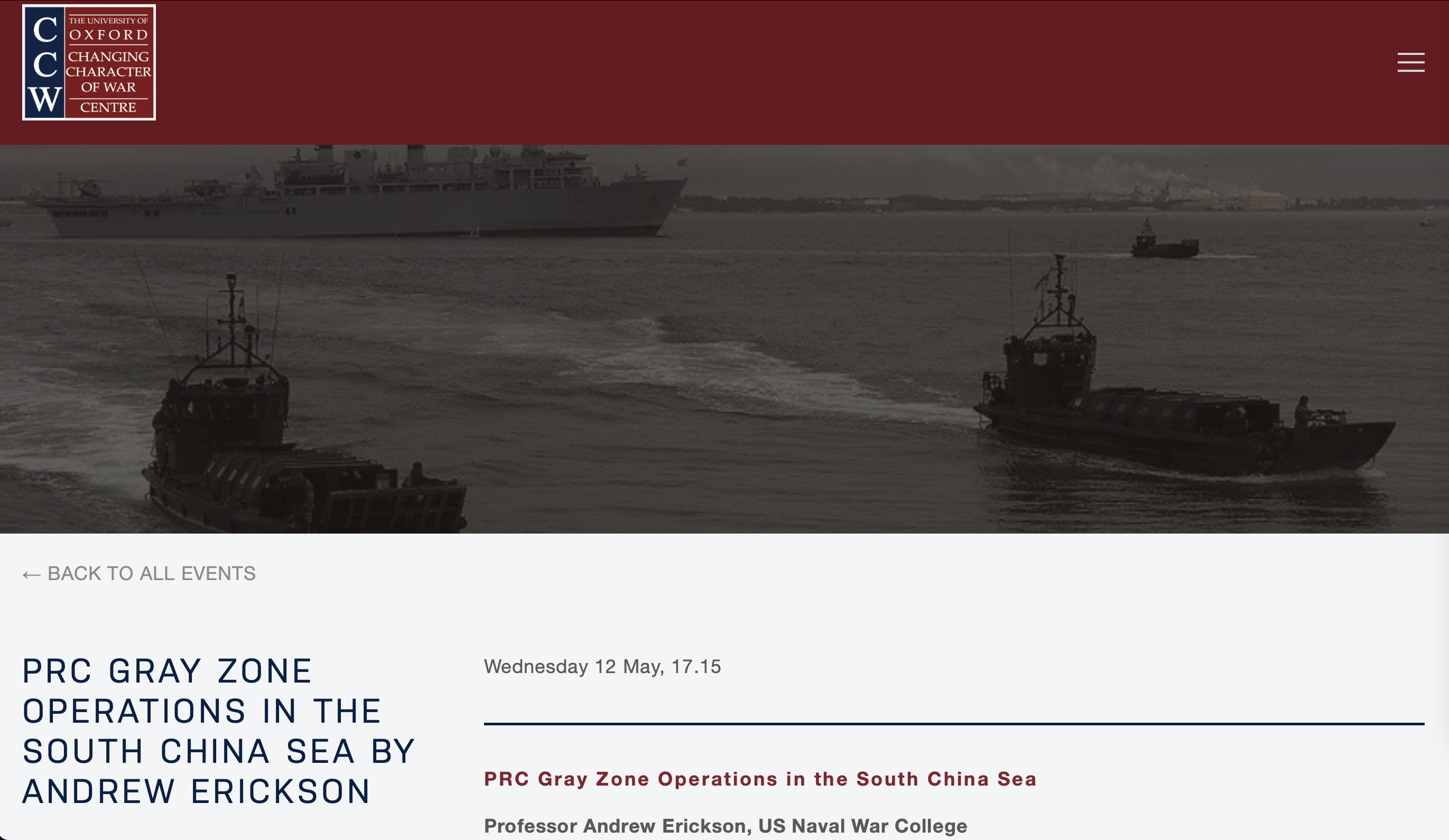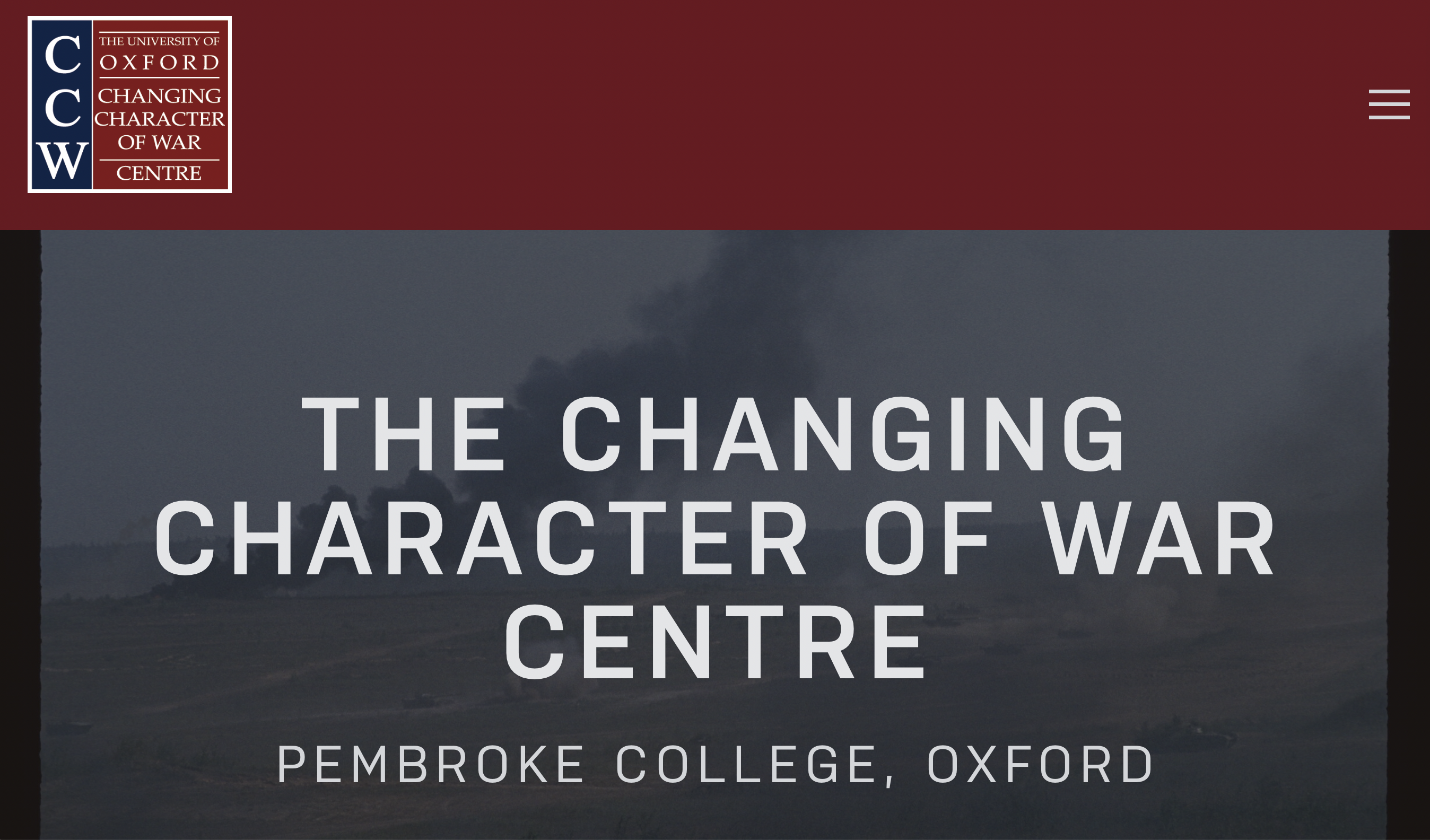Honored to Offer Wednesday Evening Seminar—12 May 2021—University of Oxford Changing Character of War Centre: “PRC Gray Zone Operations in the South China Sea”
Andrew S. Erickson, “PRC Gray Zone Operations in the South China Sea,” Maritime Power Seminar for Changing Character of War Centre (CCW), University of Oxford, based at Pembroke College and the Department of Politics and International Relations, 12 May 2021.
PRC GRAY ZONE OPERATIONS IN THE SOUTH CHINA SEA BY ANDREW ERICKSON
- Wednesday, May 12, 2021
- 5:15 to 6:45 PM BST/British Summer Time (UTC/GMT +1 hour)
- [***For U.S.-based participants–12:15 to 1:45 PM Eastern Daylight Time (UTC/GMT -4 hours)***]
- Microsoft teams Meeting: Please email info@ccw.ox.ac.uk to be invited. (map)
- Google CalendarICS
PRC Gray Zone Operations in the South China Sea
Professor Andrew Erickson, US Naval War College
A component of the People’s Armed Forces (PAF), China’s Maritime Militia is a state-organized, -developed, and -controlled force operating under a direct military chain of command to conduct state-sponsored activities. Third among China’s sea forces after the Navy and Coast Guard, the PAF Maritime Militia (PAFMM) is locally supported, but answers to the very top of China’s military bureaucracy: Commander-in-Chief Xi Jinping himself. China employs the PAFMM in gray zone operations, or “low-intensity maritime rights protection struggles,” at a level designed to frustrate effective response by the other parties involved. China has used it to advance its disputed sovereignty claims in international sea incidents, particularly in the South China Sea. Publicly-documented examples include China’s 1974 seizure of the Western Paracel Islands from Vietnam; involvement in the occupation and development of Mischief Reef resulting in a 1995 incident with the Philippines; harassment of various Vietnamese government/survey vessels, including the Bin Minh and Viking; harassment of USNS Impeccable (2009); participation in the 2012 seizure of Scarborough Reef from the Philippines and 2014 blockade of Second Thomas Shoal; 2014 repulsion of Vietnamese vessels from disputed waters surrounding CNOOC’s HYSY-981 oil rig; layered “cabbage-style” envelopment of the Philippines-claimed Sandy Cay shoal near Thitu Island; and most recently in ongoing operations in Union Banks, including Whitsun Reef. This Maritime Power Seminar will explain the nature and significance of China’s third sea force before suggesting broader implications and offering policy recommendations.
Recommended Reading, Downloadable PDFs:
- Fact Sheet: The People’s Armed Forces Maritime Militia (PAFMM)
- Records Expose China’s Maritime Militia at Whitsun Reef
- China’s Maritime Militia Ships at Whitsun Reef
- Manila’s Images Are Revealing the Secrets of China’s Maritime Militia
Dr. Andrew S. Erickson is a Professor of Strategy in the U.S. Naval War College (NWC)’s China Maritime Studies Institute (CMSI). A core founding member, he helped establish CMSI and stand it up officially in 2006, and has played an integral role in its development. CMSI inspired the creation of other research centers, which he has advised and supported; he is a China Aerospace Studies Institute Associate. Erickson is currently a Visiting Scholar in full-time residence at Harvard University’s John King Fairbank Center for Chinese Studies, where he has been an Associate in Research since 2008. He runs the research website <www.andrewerickson.com>.
Microsoft Teams Meeting: Click here to join the meeting
Source: https://www.flickr.com/photos/defenceimages/
- Posted in Wednesday Evening Seminar
The Changing Character of War Centre (CCW) is an Interdisciplinary research centre for the study of change in armed conflict. We are part of the University of Oxford, based at Pembroke College and the Department of Politics and International Relations. In addition to research projects, we offer bespoke policy advice.
CCW is generously funded by the Ax:son Johnson Foundation (Sweden). Specific projects are funded by grants received from UK research councils, the UK Government, and the US Government.
CCW has been examining the developments of armed conflict and its consequences since 2003. From the outset the intention was to bring together scholars from several disciplines, especially History, Politics, International Relations, Law, and Philosophy. CCW is now based in the naturally multi-disciplinary environment of Pembroke College and has built further links with Anthropology, Psychology and Economics, as well as a number of related Oxford centres of excellence such as the Centre for International Studies, Centre for the Resolution of Intractable Conflict, Oxford Internet Institute and Blavatnik School of Government. New links have been created with the sciences, including computer science, mathematics, and engineering, which reflects the significance of new technologies in the conduct of armed conflict today. We examine change, through the analysis of practice, conceptual development, and the theoretical foundations.
CCW has built connections with many institutions around the world who conduct research into all aspects of war and its effects. We further the quality of our research, and our impact, by inviting a selection of academics and qualified practitioners as visiting research fellows. Our non-resident fellows engage in joint research with us in specific projects. We are partnered with individuals and institutions all over the world, including the Netherlands Defence Academy, SAIS at Johns Hopkins, the NATO Defence College, the Norwegian National Defence University and Staff College, and Hitotsubashi University in Tokyo. CCW also contributes to the life of the College and the University by running events that are open to all faculty members and students, by the supervision of several DPhils, the Foreign Service Programme, and contributions to masters’ and undergraduate teaching.
The aspiration of our research is to produce work of the highest quality and greatest rigour, addressing the most significant themes and challenges produced by war, and analysing the dynamics of change. The Centre is focused and coheres around the idea of war, that is armed conflict, while engaging with other disciplines and fields to improve the quality and depth of understanding.







































